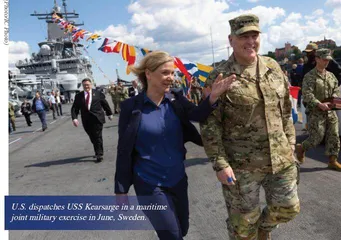Reshaping European Security Order
作者: Zhao Long

The Russia-Ukraine Conflict breaking out in the early February 2022 has gone on with no end in sight, its stalemate and impact far exceeding anticipations of all parties. Overall, the final outcome of the crisis depends on the comprehensive contest on strategic will, war damage tolerance, and internal coordination between Russia and Ukraine and among Russia, the U.S. and Europe. Moreover, as the largest military confrontation in Europe since the 21st century began, the Russia-Ukraine conflict’s reshaping effect for regional and global security order is gradually unfolding.
Regional Security Conflict Quickens Forming of Opposing Alliances
A hot war breaking out in the European continent caused security panic, resulting in further enhancement of the concept of the U.S.-Europe alliance security. On strategic orientation plane, not only did the North Atlantic Treaty Organization (NATO) Madrid Summit reposition Russia from strategic partner to most important and immediate threat, it also set to increase its rapid reaction force by seven folds to over 300,000 troops so as to strengthen its containment and deterrence to the so-called Russia threat. On policy and practical plane, some of the European countries have drastically adjusted defense and security policies. For instance, Austria and Switzerland as countries of neutrality have for the first time joined the camp of sanctions against Russia; Germany has changed its Merkel line of Russia policy and significantly increased its defense spending, including the approval of a special fund of 100 billion euros and projection of increasing the GDP ratio of its annual defense spending to more than 2 percent from 2024. More important, Sweden and Finland have discarded their previous nonaligned military policy and officially applied to join the NATO. As the representatives of all of the NATO member states signed the Accession Protocols concerning Finland’s and Sweden’s NATO membership. On July 5, 2022, the NATO northward expansion was formally launched, an expansion that will give rise to a strategic offensive and defensive longitudinal axis from the Black Sea to the Baltic Sea and all the way to the Arctic Sea. At the same time, Russia has also accelerated the military integration of the Union State of Russia and Belarus, and attempted to revive the Collective Security Treaty Organization. As a result, small and middle-sized countries sitting in between the two confronting sides are forced to attain their security through ganging up for self-protection. Against this background, the antagonistic pattern has come about fast, a pattern based on counterposing security and order concepts.
Affected by the Russia-Ukraine conflict, the Cold War legacy between Russia and the West is underscored at cognitive level. For instance, the U.S. and Europe hold on to the theory of the end of history for basic understanding of the disintegration of the Soviet Union, handling their relations with Russia from the binary opposition of winner and loser. But in the eye of Russia, it was the Soviet Union’s active strategic choice to end the Cold War, and Russia deserves to inherit the identity and status of the Soviet Union and participate on equal footing in the construction of global and European regional political and security architectures, and its traditional geopolitical security space deserves to be respected. In practice, on top of the U.S. that has long pursued a strategy to contain and weaken Russia, Europe continues to attempt to replace mutual security guarantees as promoted by Russia with an integration process based on the future of Europe. The NATO insists on an open door policy and denies that it has reached an agreement with Russia on not to expand eastward, and emphasized time and again that its eastward expansion will not pose a threat to Russia. However, NATO, as a legacy of the Cold War, continues to expand to post-Soviet region, which inevitably results in Russia's increasing security concern. For Russia, its special military operation in Ukraine can not only resolve security pressure in its neighborhood and counter NATO eastward expansion, but also help to remove the label of loser in the Cold War and reconstruct the U.S. and West-led world order. To a certain degree, the Russia-Ukraine conflict has brought the world back to a Great War era, signifying an end to the uni-polar world order since the Cold War ended. Should Russia and Ukraine achieve an armistice, all the existing political issues would not go away, and there will be a long and irreversible military confrontation in Europe. In the future, antagonism between Russia and the West on ideology and strategic orientation can only intensify and may lead to more regional conflicts.
Negative Effect Continues to Spillover
Some of the countries seek exclusive and absolute security, neglecting the collateral damage and chain reaction caused by their measures for security interests, which attributes to the outbreak and lasting Russia-Ukraine conflict. For instance, running through important documents like the Helsinki Final Act of 1975, the Charter of Paris for a New Europe of 1990, the NATO-Russia Founding Act of 1997, and the Charter for European Security of 1999, the principle of indivisible security is one of the bedrocks for post-War European security architecture whose core is not to sacrifice one country’s security to guarantee that of another country. In spite of this, the U.S.-led NATO has strengthened its exclusive security interests, using its continued expansion to deter Russia as its imaginary enemy, continuing to squeeze the buffer zone that gives both sides security comfort. Before the conflict happened, Russian President Putin had called for the West to have a dialogue in search of rational compromise and take into account each other’s interests, but failed to get due attention. Since the conflict broke out, the U.S. and Europe have failed to reflect on their strategic orientation of exclusive security but rather hardened the priority of providing Ukraine with military assistance, resulting in the fact that both sides lack the will for mutual compromise, neither wishing to give up actions to consolidate its position in negotiations by achieving new gains in the battlefield.